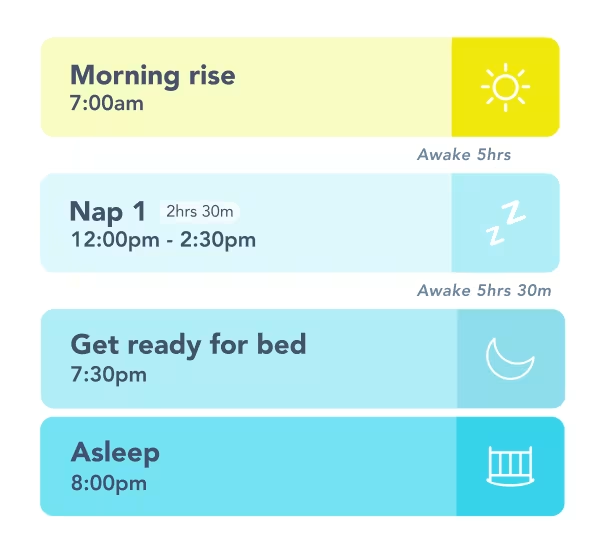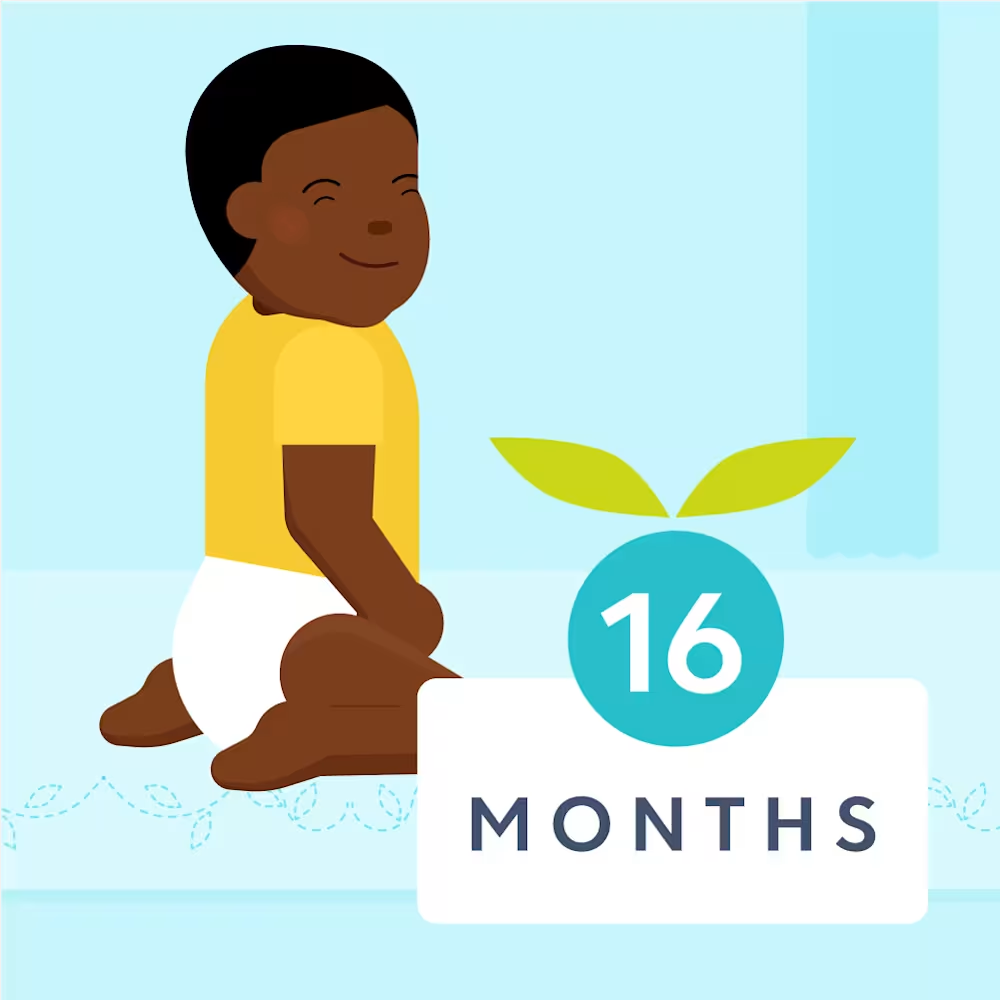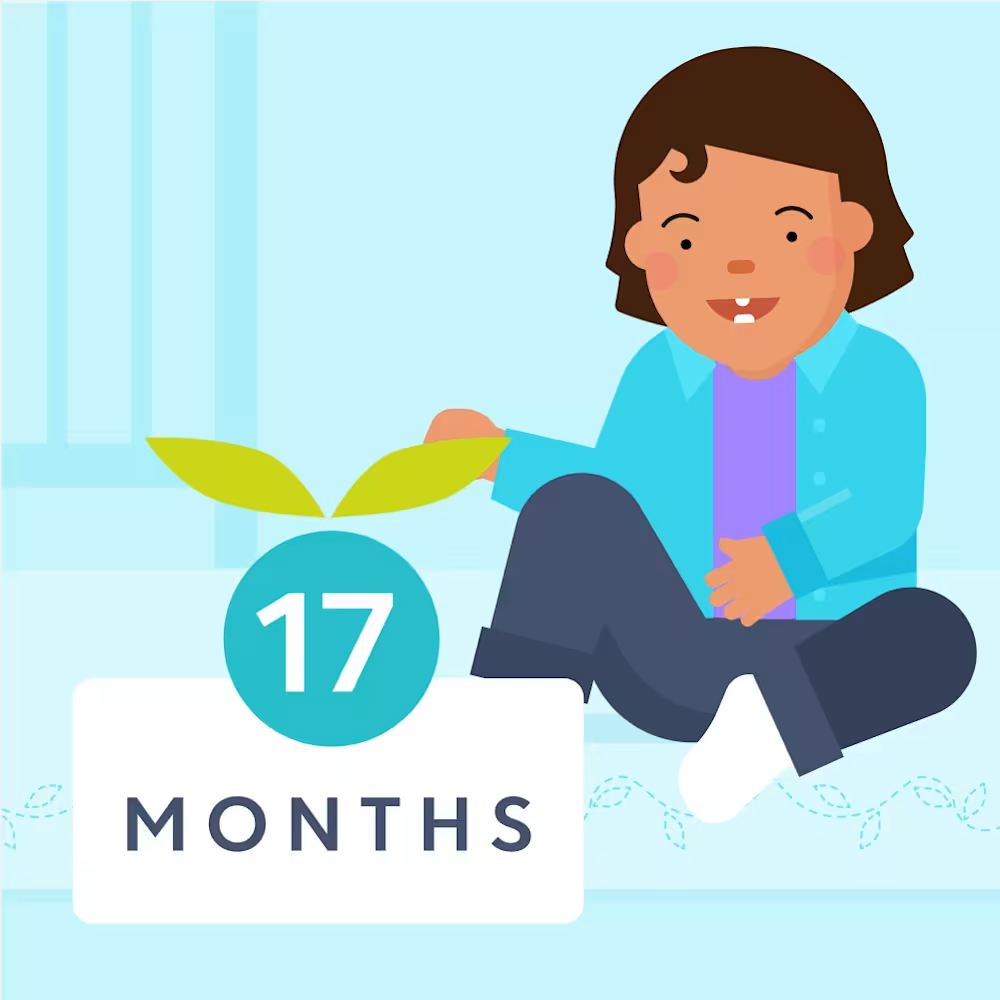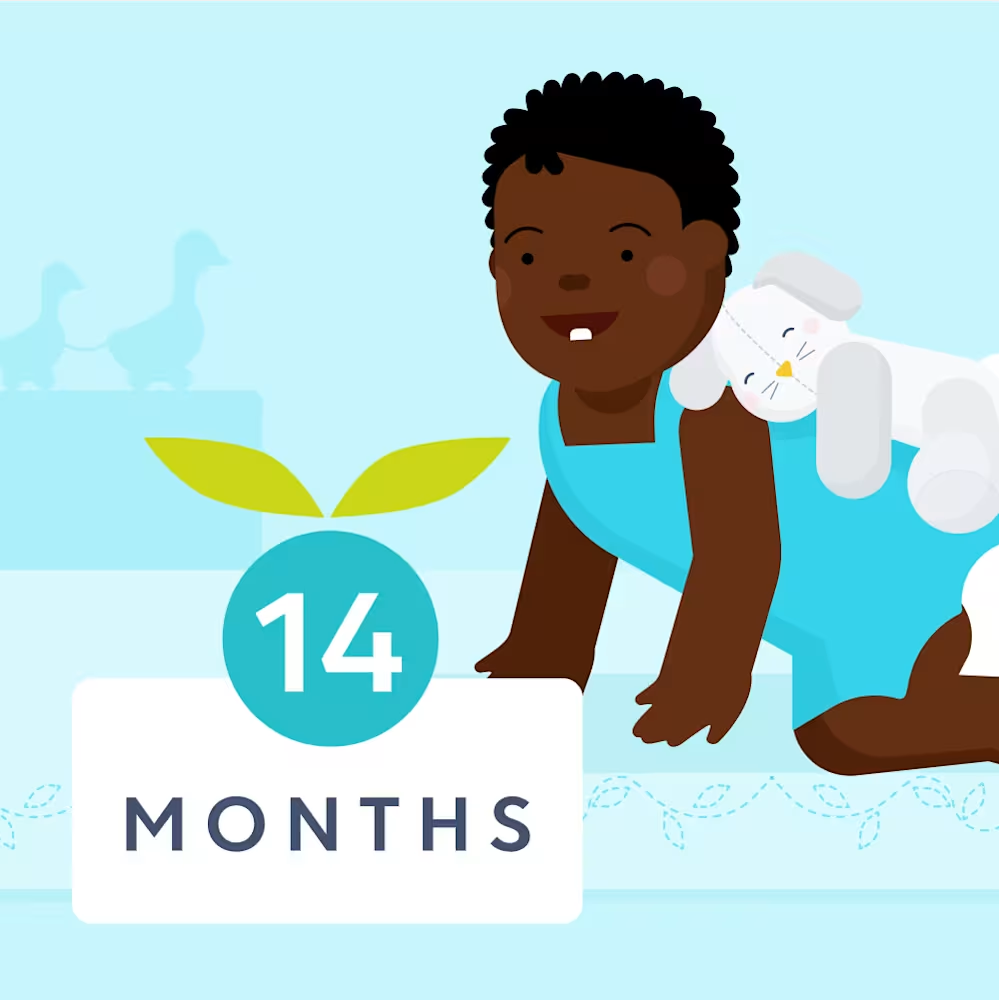15 month old sleep schedule: Bedtime and nap schedule
Updated Feb 27, 2026

At 15 months, every day may look different when it comes to sleep. It’s normal for children to take 2 naps one day and only 1 the next as they move towards a consistent 1-nap schedule. The 2-1 nap transition can take a while since it requires they stay awake around 5 hours between sleep periods, which can be a lot for kiddos!
In this article, we’ll help you navigate evolving 15 month sleep schedules, give you advice for nap transitions, and give you tips for smoother bedtimes at this age.
How much should a 15 month old sleep?
At this age, we recommend aiming for about 13 hours of total sleep over a 24-hour period. This often looks like a minimum of 11 hours at night, and 2 - 3 hours during the day, split between 1 or 2 naps.
However, there’s a range of what's considered normal and appropriate — every child has unique sleep needs. The recommended hours are just that, recommendations. We suggest keeping an eye on your toddler's mood and energy levels too when determining if your child is getting the rest they need.
Here's a quick overview of what you may expect when it comes to 15 month olds and sleep. Note that these figures are averages and should be used as guidelines.
Top sleep tip for 15 month olds
It’s not uncommon for 15 month olds to be overtired during the 2-1 nap transition, especially since it may take a week (or more) for the one daily nap to lengthen to 2 - 3 hours. If your little one’s nap is under 2 hours, try your best to extend it. If that doesn’t work, consider offering an early bedtime (but no earlier than 6:00 PM) to limit overtiredness, which can contribute to more sleep challenges.
Sample 15 month old sleep schedule

Note: Sleep needs vary by child and this chart should be viewed as an example.
Morning rise: 7:00 AM
Wake window before nap: 5 hours
Nap: 12:00 PM - 2:30 PM (2.5 hour nap)
Get ready for bed: 7:00 PM
Asleep: 8:00 PM
Naptime schedule for a 15 month old
Those 15 month olds who have transitioned to a will need the nap in the middle of the day. We recommend between 5 and 5.5 hours of awake time before their nap in order to allow an appropriate amount of wake time before bed. Most 15 month olds who are taking 2 naps per day sleep best with about 3.25 - 4 hours of awake time before the first nap and about 3.75 - 4 hours of awake time before their afternoon nap.
How long should a 15 month old nap?
At 15 months, we hope to see 2 - 3 hours of daytime sleep. For children who haven’t transitioned to 1 nap per day, consider capping naps at 90 minutes to avoid a late afternoon nap that might push bedtime late and interfere with night sleep
How many naps for a 15 month old?
By 15 months of age, many children have outgrown their 2-nap schedule in favor of one daily nap around lunchtime. Other toddlers this age still need 2 naps per day. If your schedule allows it, kiddos may also switch between 2- and 1-nap days for a few weeks during this transition as they get used to staying awake long enough to fully transition to one daily nap.
By 18 months most children typically complete the transition to a 1-nap schedule, but there’s no need to rush it. Dropping a nap too early can contribute to more sleep challenges due to overtiredness.
Signs that your child is ready to drop a nap include:
Taking very short naps
Resisting one or both naps
Consistently sleeping less than 10 hours a night
2-nap schedule
1-nap schedule
Bedtime for a 15 month old
Aiming for a consistent bedtime can help promote better sleep at this age, but we know this isn’t always easy — especially during a nap transition. As your child adjusts to a new sleep schedule, some nights may be trickier than others. To help minimize bedtime meltdowns and overtiredness, focus on creating a predictable routine and be sure you’ve factored in sufficient wind-down time. Some toddlers need about 45 minutes to settle down before bed.
For example, your child’s nightly bedtime routine may include a warm bath, massage, changing into sleep clothes, and cuddling up for story time and songs. Even after a calming bedtime routine, it’s normal for your child to need 10 - 20 minutes to fall asleep once the lights are off. It takes a bit for those active minds to settle into sleep mode!
What time should a 15 month old go to bed?
At this age, the goal is 10 - 12 hours of nighttime sleep, depending on nap patterns. Toddlers that are starting to outgrow their 2-nap schedule may only be able to sleep 10 hours per night, while a kiddo who fully transitioned to 1 nap may need a full 12 hours. To get there, you’ll want to base bedtime on the length of time your child has been awake and your desired wake-up time. For example, if your goal is for your 15 month old to wake up at 6:30 AM and they take one nap, their bedtime should be between 6:30 - 7:30 PM.
Why does my 15 month old keep waking up at night crying?
Some 15 month olds experience a new bout of night waking around this age. Factors that may be at play include:
Falling asleep with assistance and desiring the same support overnight
Dropping to 1 nap prematurely
Needing a schedule adjustment
Mastering milestones
Hunger
If you’re looking for more sleep support, consider submitting for a personalized, step-by-ste Sleep Plan via .
Is there a 15 month old sleep regression?
Although there isn’t a predetermined , it’s not uncommon for children to experience sleep challenges around this age. If your little one has been sleeping well then goes through a period of bumpy sleep (calling out overnight, resisting or skipping naps, etc.), we’d consider this a sleep regression. However, every toddler is different and not all children will sleep poorly at this age.
Can my 15 month old sleep with a pacifier?
Pacifiers can be used during sleep and awake times at 15 months. Your 1 year old can likely replace their own paci if it falls out during sleep. To increase the likelihood of this, we recommend putting a couple in their crib after they fall asleep so they can easily find one and pop it back in instead of calling out for you to help. Make sure you’re checking pacis over time to be sure they haven’t turned color or torn over time, especially if your little one has teeth. It’s best to replace old binkies if you see signs of wear and tear.
Can a 15 month old sleep on their stomach or side?
The AAP recommends always placing your baby on their back to sleep []. By 15 months, it’s safe to let your toddler sleep on their stomach or side if they roll into that position on their own and can roll both ways independently. Allowing them to find their own comfortable sleep position is normal at this age.
Can I sleep train a 15 month old?
Sleep training can be a useful tool if you’re looking to remove parent-led sleep associations (e.g. rocking or feeding to sleep) and teach your child to fall asleep on their own. If you’re worried about “cry it out” methods, note that there are many . Some are slower and more gradual while others are faster and prioritize results. Caregivers should decide which method fits their family.
What are the developmental milestones for a 15month old?
At , your baby is likely working on exciting new things like walking and talking. Here’s a checklist of milestones your baby may be trying at this age:
Says (or tries to say) 1 to 3 other simple words
Can take steps on their own
Stacks two blocks or other objects
Points or gestures to ask for something
Copies you or others when playing
Gives kisses and/or cuddles
Claps when happy or excited
Can identify 1 to 6 body parts
Tries to use things the “right” way (e.g., trying to brush their hair with the brush)
Does a 15 month old need to eat during the night?
At this age, most babies don't need to eat overnight. If you suspect your child is waking up overnight or early in the morning due to hunger, try to ensure they’re getting enough calories throughout the day. Also consider the timing of dinner. If they're eating on the early side, try moving it a little closer to bedtime or offering a healthy snack before bed.
Takeaway
At this age, we recommend aiming for about 13 hours of total sleep over a 24-hour period. This often looks like a minimum of 11 hours at night, and 2 - 3 hours during the day, split between 1 or 2 naps.
Many children have outgrown their 2-nap schedule in favor of one daily nap around lunchtime at this age. Other toddlers this age still need 2 naps per day and that's OK too. Most kiddos transition from 2-1 naps per day between 14 - 18 months.
Signs that your child is ready to drop a nap include taking very short naps, resisting one or both naps, and/or consistently sleeping less than 10 hours a night.
If you're curious about what lies ahead in the coming month, glimpse into the future to see what you might experience once your baby is on a . Also check out a to see how far your little one has come.
Share article:
Note: The content on this site is for informational purposes only and should not replace medical advice from your doctor, pediatrician, or medical professional. If you have questions or concerns, you should contact a medical professional.
4 Sources
Share article:








